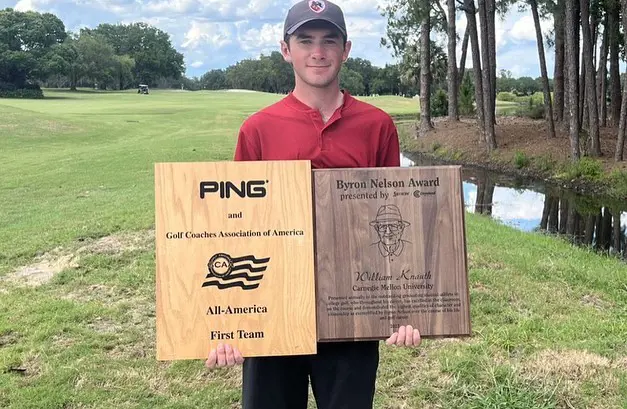Will Knauth is looking forward to the little things.
Just thinking about the practice rounds at TPC Craig Ranch on Tuesday and Wednesday makes him thrilled. He laughs eagerly at the thought of someone asking for his autograph. His brain shatters at the thought of his Pennsylvania pals perhaps coming to Texas to watch him play.
A professional golfer’s existence is made up entirely of boring stuff. Knauth doesn’t play golf professionally though. He is a concert violinist, a pilot, a Columbia Ph.D. candidate, and a distinguished NCAA Division III athlete, among other things. But he isn’t a professional golfer.
Nevertheless, for a week, he will be among them.
Knauth won the 2022 Byron Nelson Award, presented to a graduating senior for their success in the classroom, on the course, and in the community, and is competing in the AT&T Byron Nelson Championship on a sponsor exemption.
Knauth, a former star athlete at Carnegie Mellon, defeated Cole Hammer and Trent Phillips, two highly regarded Division I amateurs, to become the first D-III athlete to win the honor since 2008. Dylan Frittelli, Maverick McNealy, McClure Meissner, and Brandon Hagy are examples of previous winners.
He finds it difficult to comprehend that his quest gets him to a PGA TOUR event. He entered the game later than most people. He was no prodigy. His family was unable to pay for him to attend prestigious amateur competitions or take regular training. At Carnegie Mellon, he nearly didn’t play any golf at all.
“Who am I to convince others to spend money to watch me play golf? How incredible is it that I will actually be playing a TOUR event ?” Knauth said.
All well, perhaps he doesn’t give himself enough credit.
Knauth had the lowest scoring average in Division III last year, despite the fact that he isn’t Rory McIlroy. He won twice, finished inside the top 8 of every fall event, and spent much of the season ranked as the top D-III golfer. But in regard to one point, he is correct. His journey to his first TOUR start has been anything but conventional.
Golf was accidentally introduced to Knauth. No one in his family participated in the game. He had no idea the sport even existed until he was 8 years old. He only discovered a golf course while on a trip with his family to northern Wisconsin. He was able to use a 3-iron that was on loan from a clubhouse employee to practice hitting some balls.
“I was immediately enthralled” he mentioned.
The employee offered Knauth an old putter to keep as he walked away. His family soon after gave him a few extra clubs for Christmas. That was the start.
Since then, he has spent every summer at the 36-hole muni White Deer Golf Course, which is close to his hometown of Williamsport, Pennsylvania. Usually, 18 or 36-hole loops were played. His daily total of 72 holes was a personal best. He’s had fewer lessons than he can count on one hand. He mostly learned about the golf swing by watching other golfers play, which may have been due to naivete or inherent talent.
Only when the regulars on the course spotted Knauth’s talent and encouraged him to attempt it did the idea of playing competitively take off. They advised him to start participating in regional North Central Pennsylvania Golf Association competitions, which cost $8 to enter, and offered pro shop credit to winners. He paid for his golf in this way. He had paid the $8, won the competition, and used the winnings to purchase his golf balls.

He wasn’t aware of the procedure, therefore the logical next step would have been to try his hand in elite junior contests. He didn’t even learn about the American Junior Golf Association (AJGA) until his senior year of high school. He was the sole golfer in most of his classes in high school, and the competition was seldom fierce. In two rounds of golf, Knauth recalls winning a district championship by a margin of 24 strokes. He remembers that during one game, his team had four touchdowns totaling 420 shots. The other three players averaged a little over 115, while Knauth made 70 shots. He finds it amazing that he was able to go from that atmosphere, where the majority of golfers spend their whole life being prepared for professional golf, to competing in a PGA TOUR event.
“I never did anything correctly during my journey; all I did was work hard and play the game with unreserved passion. I was only partially aware of all the things I was supposed to be doing and wasn’t doing them.” Knauth said.
He does not regret taking the path he did. The AJGA competitions would not have been affordable for his family in any case. It also wouldn’t have affected where he attended college. Whether golf was involved or not, he was still going to Carnegie Mellon. It’s pure luck that golf ended up being a part of it.
Knauth searched for the golf coach, Daniel Rodgers, while on campus. He had sent him an email stating his desire to join the squad, but he had received no response. Josh Centor, the athletic director, was there when Knauth came seeking Rodgers. Centor was so impressed by what he said that he begged Rodgers to get in touch with Knauth.
Knauth still didn’t perform well at important competitions. Rodgers didn’t add Knauth to the squad until he entered several USGA qualifiers and produced encouraging outcomes.
Knauth continued to struggle in significant competitions. Knauth wasn’t added to the team until after he competed in numerous USGA qualifiers and had excellent results.
“It was incredible to see where he began and where he ended,” Rogers said
As a senior, Knauth’s scoring average fell from 76.2 as a freshman to 71.5. There were no restrictions on where, when, or for how long he may practice anymore. Knauth had all the tools he needed to get better, and he did it with the help of the school’s resources and simulator. He made history by being the first golfer to win the Byron Nelson Award and the first top-ranked male golfer to compete at Carnegie Mellon.
“A barrier was no longer in his path. He had no one to tell him no.” Rodgers said
One may assume that Knauth has spent every waking hour practicing in the simulator or on the course in preparation for his debut TOUR start. Surprisingly he is not. Knauth believes he is playing less golf than ever. It is okay to experience this if you pursue a statistics Ph.D. at Columbia. Additionally, living in the center of New York City will be difficult for a college student to get much practice. He has struggled to strike a balance between that and his excitement for AT&T Byron Nelson. He has been aware of this week’s arrival for more than a year, and it has “consumed his thoughts.” It also reminded him of the ideas he had when he was a senior in college and debated whether to try his luck as a professional.
It was never something Knauth had thought about until he went on a hot streak in his last year of college, but it changed when numerous people with connections to the professional game told him he had a chance if he committed. The strategy Knauth had always had was thrown off by it. School is the top priority; golf is the hobby. His thoughts started to wander to what a golfing career may entail for him.
“I made the decision that there may be a chance, but I’m not confident enough in it to forego the other opportunities because I know I’m not Scottie Scheffler. By taking the chance on myself, it may work out with golf, but it probably won’t.” He spoke.
Knauth is still unsure of where those opportunities might take him. He is about to complete his first year at Columbia and claims that juggling two majors and golf at Carnegie Mellon has been easier than missing finals to attend the AT&T Byron Nelson in Dallas. Next year, he would begin his finals seriously. Naturally, less time has been available for golfing. He admits his game isn’t nearly where it once was and has had to be choosy in how and when he practices.
“I’ve obviously deteriorated from my undergraduate self. There is no doubt. Even when they are mixed in with more unpredictable golf, the truly strong rounds are still present.” he said. Over the past few months, he has spent all of his free time at his flat or at a nearby simulator practising his speed. He arrived in Dallas early the previous week to prepare.
Knauth was on the verge of enrolling at a music conservatory when he decided on Carnegie Mellon. He has been a violinist since he was 5 years old. “It was the first skill I really excelled at,” he said.
While still in high school, he participated in the state orchestra and played for pay at weddings and other occasions. He would travel to contests with his violin during his time in college.
“Have you got a suppressor on that thing? I would jokingly ask him as he carried it over his shoulder.” Rodgers said.
He still plays periodically, but burnout was a lesson he learned early. His gift was no longer a labor of love but merely labor after hours of diligent practice. It is comparable to his choice not to pursue a professional golf career. He felt that making it his profession would diminish some of the love.
“I learned from it that you don’t have to push yourself in every situation,” he said.
The same is true of his interest in aviation. Knauth’s Father is a Civil Air Patrol volunteer and holds a commercial pilot’s license. Will was in the air since he was a young child. He recalls his father handing him the controls once they reached a safe altitude when he was just 5 or 6 years old. They would fly if there was a golf course that Knauth wished to play and an airport close by. He chose to take an aircraft instead of the three-hour drive when he went to Carnegie Mellon. From takeoff through touchdown, Knauth flew. Before the nearby flying school was closed, he was just two flights away from earning his complete pilot’s license.
“Simply enough, life got in the way. College happened. Licenses ran out. Still, it was a wonderful experience.” he said.
Conversation with Knauth will reveal his depth of knowledge on a variety of subjects. He has a strong interest in inexpensive golf. He would not have been able to play frequently if it weren’t for the fortunate fact that he had a junior membership at White Deer that only cost $180 a year. When he was younger, his family could not afford to pay for lessons. Additionally, they were unable to afford for him to participate in local activities that would have drawn the attention of Division I institutions. He wasn’t even aware that he needed recruitment.
“There are certainly many talented young players in the same situation. I wish there were more reasonably priced opportunities available. The golf ball, meanwhile, doesn’t give a damn about your identity once you’re on the course.” he said.
He has conducted mathematical research on how fairway width affects the score. Whether aiming away from the hole results in fewer birdies than pin-seeking has been studied by him.
He can hold his own when the conversation shifts entirely to themes like meditation or the pressures of aging. If you get off topic, he’ll show you that he loves the piano and is an excellent Call of Duty player.
He has an unusually introspective outlook on life for a 20-something who grew up in the middle of Pennsylvania. He can still clearly recall the day he received the Byron Nelson Award. On the fourth hole at the storied Longue Vue Club in Verona, a Pittsburgh suburb, he was in the fairway. He was perplexed as to why his teammates were still gathered in a circle around the green. Rodgers informed Knauth that he had a phone call to make as he neared the green, and it was a message of congratulations. Knauth was shocked after stating for weeks that he had little chance of winning.
It appeared as though the sun had just emerged from the clouds. There was only light, but everything else felt the same as it always had. It seemed strange.
His viewpoint is much more profound than one may anticipate. He is realistic about his chances this week at TPC Craig Ranch. He thinks his chances of making the cut are 4-to-1.
“It is not pessimistic. He is content with his position and is aware of it,” he said.
“This week, I don’t want to demonstrate that I can play golf in any way. No matter how excellent I get, there are many players who are better than me. But I am special. At AT&T Byron Nelson, no one else in the discipline is presently working towards a doctorate in statistics. That’s what I do. Finding anything that adds a little bit of individuality to what you’re trying to do is all that is necessary, rather than pretending that I can and that I want to be the best.” he said.
There is little doubt that Will Knauth will stand out at the AT&T Byron Nelson this week, regardless of his golf performance.



